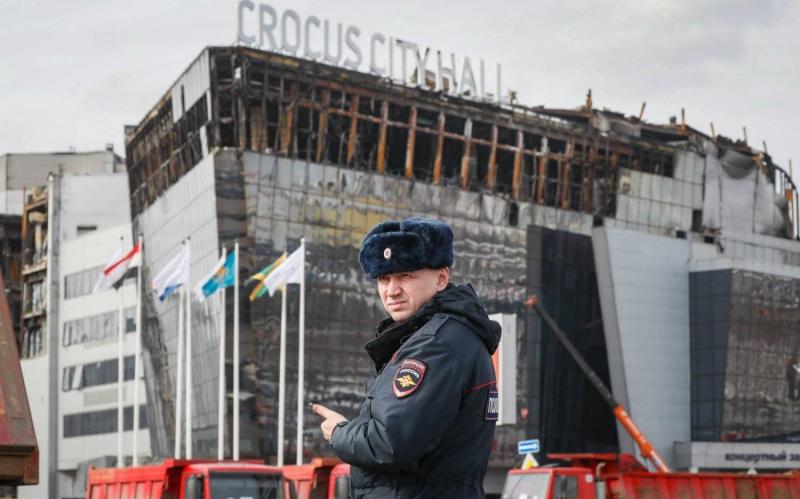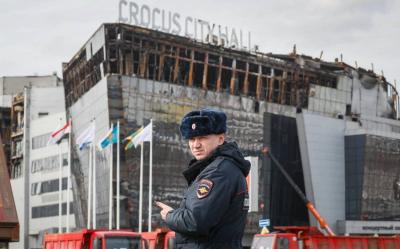On the night of March 22, Moscow witnessed a horrific massacre at the "Crocus City Hall" theater in the suburbs of the capital, where terrorism claimed the lives of over 150 people and left 120 injured. This chaotic day reminded the city's residents of the Russian Chechen wars, with the city being a stage for various terrorist operations, the most recent being the October 23, 2002 seizure of the "Dubrovka" theater during a concert, which resulted in the deaths of numerous hostages at the hands of Russian security forces, unable to thwart the terrorists’ plan to take around 900 civilians and artists as hostages. Between the past and present, history repeats itself as terrorism uses civilians to execute its projects and settle scores, turning ordinary citizens into hostages of these heinous plans.
Contrasting the Dubrovka incident, where terrorists made their demands giving the Russian state three days to withdraw from Chechnya, the Crocus operation lacked any demands; the attackers' goal was clear—to kill visitors by setting the theater ablaze with Molotov cocktails. The Russian failure incites fear in Moscow, yet during the period between the Dubrovka and Crocus operations, there were conspicuous attacks against the Russian state and its interests by ISIS, which now sees confronting the West, including Russia, as a priority in its war against the enemies of Islam.
Prominent among these operations was the assassination of Russia's ambassador to Ankara, Andrei Karlov, on September 19, 2016, and the attack on the Russian embassy in Kabul in September 2022, alongside numerous operations in the Caucasus and Syria by ISIS. There are strong motives driving ISIS against Russia, foremost of which is Russia's intervention in the Syrian war in 2015 and the significant blows dealt to ISIS by Russian forces, which weakened its presence in Syria, much like in Iraq against the Western coalition. ISIS views Russia as one of the Western countries oppressing Muslims and participating in their killings. There are around 7,000 fighters in Syria and Iraq of Muslim origins from the Russian Federation, Central Asia, and the Caucasus, who have numerous grievances against Russia regarding its treatment of them as Islamists.
A crucial point is that ISIS's Khorasan branch, the most violent faction of the group, has been in direct conflict with the Taliban in Afghanistan and openly considers Russia a friend in its alliance with its enemy, the Taliban. The Khorasan branch has renewed its capabilities in regions of Afghanistan, the Caucasus, Central Asia, and Russia, organizing itself through new groups trained in advanced techniques, fighting against Russians in Syria and Afghanistan. The organization succeeded in revitalizing its capabilities and resuming confrontations from Afghanistan and the surrounding area, carrying out operations against the U.S., Pakistan, Russia, and the Taliban.
The organization faced significant blows from the Taliban and the U.S. between 2018 and 2021, during the U.S. withdrawal from Afghanistan, when Khorasan managed to reorganize its Asian and African branches, electing shura leaders for the first time from outside Afghanistan and Pakistan. Despite American warnings from the commander of U.S. Central Forces about the likelihood of terrorist activity against Western and American interests in the region, public spaces are now expected targets for anticipated terrorism, with Russia among these targets. On March 7, the U.S. embassy issued warnings of a possible terrorist operation against Moscow, urging citizens to exercise caution.
The question arises: why did the U.S. embassy issue this warning while all Western embassies adopted it, while Russia ignored it, especially since Russian-American relations are severed, and there is no communication line between the two due to a lack of trust?
Russia has not responded to U.S. messages as it did previously when it received security and intelligence information. Therefore, Russia tries to blame the U.S. for not responding while closing off lines of communication. Today, it blames the U.S. for its failure to warn, ignoring the closing of communication due to severe disagreements on many recent developments between the two parties. Despite acknowledging the Khorasan branch of ISIS's claim of responsibility for the attack in Moscow and broadcasting multiple videos detailing the execution and preparation of this terrorist operation, Russian media argue that the visual details revealed in the claim differ from past ISIS claims, such as those executed in Turkey regarding writing and symbols and the agency involved.
Historically, Russians have struggled to distinguish between different Islamic movements due to a lack of expertise in studying various Islamic organizations, which leads to confusion between moderate and extremist groups.
The Russian attempt to link this operation to Ukraine seems to be a strategic move from President Vladimir Putin, to assert that extremist factions accountable should be addressed through military means. However, as his missiles exploded across eight Ukrainian provinces—resulting in the death of innocent civilians and systematic destruction of Ukraine's infrastructure—he declared he was fighting a decisive battle against the West, armed with claimed victories.
Putin's statements on March 23 link the attack to Ukrainian elements, noting that perpetrators fled to the Russian border city of Bryansk, suggesting an open path for entry into Ukrainian territory. Despite ISIS announcing the success of the perpetrators, they evacuated the scene, and Russian authorities launched a round of arrests of suspects, quickly recording their confessions. Doubts have arisen about how the attackers managed to reach the theater with weapons, who trained them, who brought them there, and where Russian police failed to detect this plot.
Furthermore, if Russia claims that Ukraine prepared and executed this operation, and we have seen distinct types of Ukrainian operations in Russia that Ukraine has publicly claimed responsibility for, it indicates that Ukraine has significant capabilities in penetrating Russian territory. Ukraine, however, has rejected Russia's vengeful narrative, asserting that Putin seeks to justify his aggressive actions against Ukraine without any credible sources to launch an attack.
Ukraine will not take such steps, no matter how advantageous it may seem, as it would not aid the Ukrainian cause nor gain support from countries backing them against Russia. The Russian public would not welcome an attack that results in the death of innocents, granting Putin a license to carry out more brutal aggression against Ukraine and further entrenching his regime.
Russia's insistence on linking the attack is an attempt at dialogue with the West, portraying itself as a part of a coalition to combat terrorism that threatens your nations. It is crucial to recognize that the recent terrorist attack linked to Ukraine does not convince the West regarding Russian failures in intelligence and law enforcement, which harken back to the early days of Putin's regime. Therefore, understanding who supports the Khorasan organization and exploits its violent acts for personal interests remains vital.




